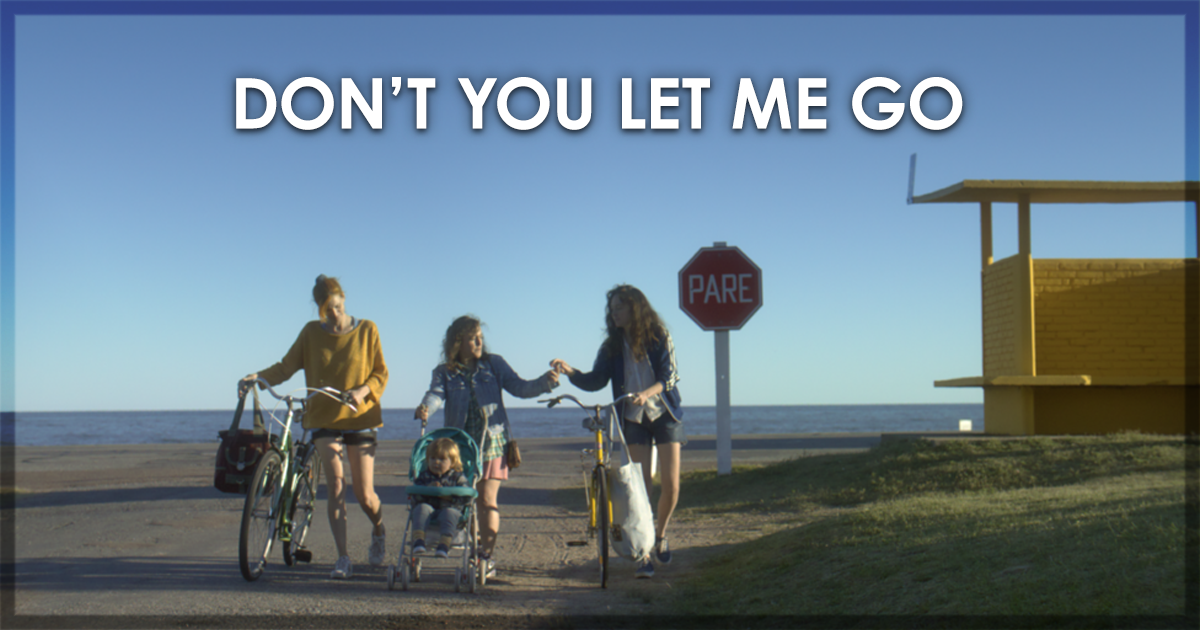In the 20th century, Dr. Erich Lindemann changed the medical understanding of loss through his Grief Work theory. In this theory, he stated that the way of overcoming the death of a loved one and regaining oneself is the emancipation from the bondage of the deceased, readjustment of the environment in one where the person is missing, and forming new relationships. While Lindemann’s contributions were attached to a context of war and economic distress, it is still possible to use his conceptualizations to understand grief. Furthermore, grieving is trying to answer questions that may never have a response. In this sense, Don’t You Let Me Go (Agarrame Fuerte) by Ana Guevara and Leticia Jorge switches perspectives.
In their film, they don’t look for why that person is not here anymore, but a reality where they have more time, a weekend. It narrates the story of two best friends, Adelia (Chiara Hourcade) and Luci (Eva Dans), who recently lost Elena (Vicky Jorge) to an unspecified illness; some dialogues suggest it may be a form of cancer. While they cope with the roughness of a funeral, they have to support each other and Elena’s family. They also analyze the absurdity of the ceremony and situations. One of them is Elena’s mother demanding a cross to be removed from the wall because her daughter is not a Catholic person.
Divided into chapters, similar to a tale book, each has a title that narrates what they will go through. The first one: We didn’t ask for any cross. It goes through their processing of death while they support a close friend who is pregnant. Ade and Luci try to recognize faces among an ocean of different persons who decide to say a last goodbye. In this first chapter, The only figure we see of Elena is a photo of the top of her coffin. It helps to create a grief sentiment in the viewer, and it is an odd one since the only information we have is the fact she is dead and a picture of her pale skin and ginger hair. The directors do not rush the story and create a sense of knowing the person who vanished.
The second chapter, Hold Me Tight, How Much Sugar is Too Much Sugar, and the Importance of Learning Portuguese. It is the longest one and deservedly so. It goes from the premise of Ade going inside a bus, and she goes to a passage of a close past, where she is in a beach house with Elena while they wait for the arrival of Luci and Paquito, her baby. Through its dreamy score, we go to a place where a duality between reality and a dreamlike world is present. It just takes the public to see the love between those three characters (and a half, since Paquito is a tiny human). The first action Ade does in the house is to cuddle with Elena, who complains it is too hot. Adelia wants to hold Ele dearly, as tight as the chapter and Spanish titles suggest.
It is curious to understand that Ade does not want to talk about her death or engage in philosophical conversations with Elena as she knows what may or may not know what will happen in the future. The world-building confronts the barriers of reality and memory. Adelia only wants time. Don’t we all? One more gin bottle with her best friend. A last night of dancing. An ultimate day on the beach reading a mystery book in the sand with them. A last hug. They engage their final night with poorly made meals, cheap drinks, and cigarettes. Adelia, Elena, and Luci dance all night for one last time. Even conversing about Elena’s marriage, which she would do soon after the weekend, Ade knows there are more important words to say.
In this sense, Ana Guevara and Leticia Jorge avoid the conventional troupes of loss and only observe a last breath of love. A reality so perfect that it is bliss, but it is a sensible analysis of losing someone. Adelia enjoys her last moments, and we reflect upon grieving. Wouldn’t everything be better if we could enter a bus heading to the past? Unfortunately, this model of the bus is not available in the fleets. It is only possible to endure in Lindemann’s grief work theory. Meanwhile, the lead trio delivers beautiful chemistry and acting. The cinematography from Soledad Rodríguez works to build that reality, and the score, thanks to Luciano Supervielle, is heavenly.
The end of the last chapter is How could anyone be sure about things anyway? It embraces the dream reality rather than confronting the lack of someone’s presence. They embark on a journey in the sea. The public is left with plenty of observations and reflections to question reality while we enjoy the beauty that Ana Guevara and Leticia Jorge deliver us in Don’t You Let Me Go.
Don’t You Let Me Go recently screened at the Tribeca Film Festival.
Learn more about the film at the Tribeca website for the title.
You might also like…
‘Made in Ethiopia’ Review: Documentary Explores Capitalism’s Growth in Rural Ethiopia


